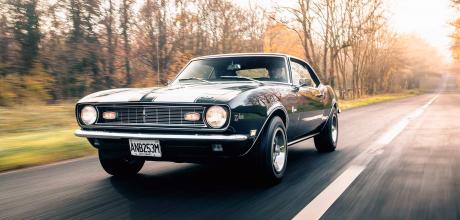1968 Chevrolet Camaro Z/28 - on the road in super-rare original muscle car
Rare in the USA, let alone the UK, this ultra-low-mileage performance Camaro has had notable racing driver owners – both then and now.
Words Mark Dixon
Photography Jonathan Fleetwood
GREEN AND MEAN
BRUTAL CHEVY CAMARO Z/28 BURNING RUBBER IN A MUSCLE CAR ICON
On the road in super-rare original muscle car
‘I like going fast,’ says Amanda Stretton simply, when I ask this racing driver, journalist and broadcaster why she bought her immaculate 1968 Chevrolet Camaro Z/28. ‘My dad, Terry Cohn, owned lots of fabulous cars, pre-war Alfa Monzas and so on, and shortly before he died he bought a Hertz Mustang GT350. It was the only car of his that I really wanted, because it was a kind of “f*ck off” car. I just thought it was really, really cool.’
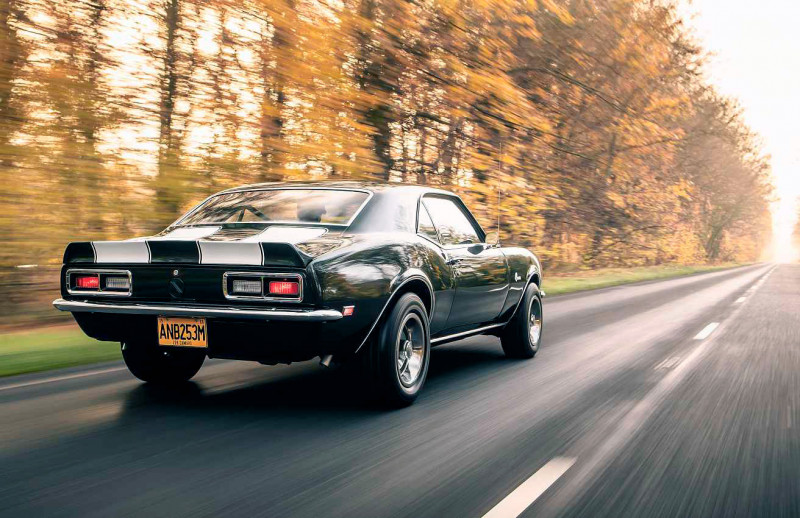
Ah, OK. So what happened to the Mustang? ‘After dad died, the executors wouldn’t let me have it unless I paid above the best commercial offer. GT350s were out of my price range and I also realised that if I bought one, everyone would assume it was a replica. So I started to think again, and then my friend Simon Drabble found this Camaro tucked away in Barrow-in-Furness, and I went “Ohhh, it’s perfect!” and bought it.’
‘GENERAL MOTORS WAS SPECIFICALLY TARGETING THE RACING MARKET WITH THE Z/28’
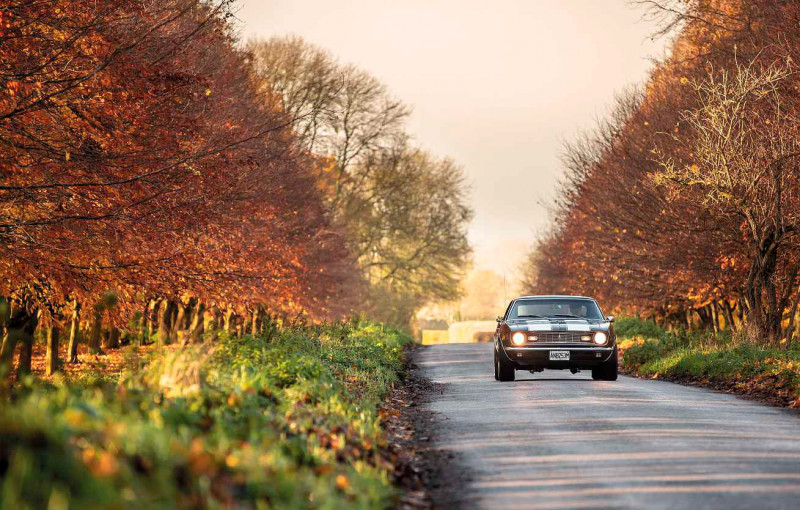
What Simon/Amanda had found was a real unicorn: a very low-mileage, extremely original example of the ‘hot’ Camaro, the Z/28. Chevrolet built only 7199 of them in ’68 and the survival rate is in the low hundreds. Introduced in 1967 to take on Ford’s Mustang, the stock Camaro spawned a variety of souped-up versions – RS, SS and Z/28 – of which the Z/28 was top of the tree. It was kept very much under the radar, however, and it doesn’t even appear in the brochure advertising the ’68 range, even though the RS (Rally Sport) and SS (Super Sport) both feature heavily. The reason for this low-key approach seems to be that GM was specifically targeting the racing market with the Z/28. It was offered with a range of V8s, starting with a 302ci that, most significantly, had been cleverly designed to scrape under the Sports Car Club of America’s race series capacity limit of 305ci by combining a 283 crankshaft with a 327 block. Official output was 290bhp but rumour has it the reality was closer to 360bhp, and you can probably add another 40lb ft to the claimed 290lb ft maximum torque figure. Amanda’s car has the 302 and is appropriately finished in British Green, although it was sold new in the States and didn’t arrive in the UK until the early 1970s. No-one knows who brought the car over but its history from then on is immaculately documented. Think Camaros and think racing in the UK, and one name immediately springs to mind: Stuart Graham, the only man to win a TT race on both two wheels and four. A hugely successful motorcycle racer in the 1960s, he then switched to cars and repeated his success in Group 1 Touring Cars in the mid-70s – with a Camaro. Stuart was the man who really introduced Camaros onto the UK racing scene, winning the big-capacity class in 1974 and ’75, and finishing third overall both times, before going on to have similar results with a Ford-backed Capri 3.0-litre. And it just so happens that Stuart bought and sold Amanda’s Camaro in the UK when it was nearly new, and bought it back again several years later.
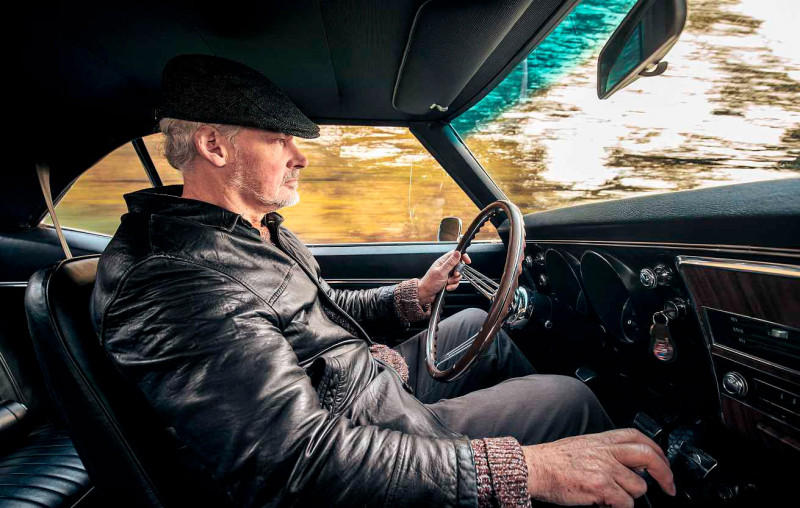
More accurately, Stuart and his brother Chris bought and sold the car. Both had trained at Rolls-Royce, but Stuart left to go racing motorcycles while Chris stayed on at Crewe as an engine builder, before they reunited in 1968 when Stuart retired from the bike racing and Chris joined him in purchasing a small garage business in rural Shropshire. Chris loved V8 engines and so they naturally gravitated into buying and selling American cars.
‘IT STRIKES YOU THAT THIS WOULD BE A FANTASTIC MACHINE FOR PROPERLY LONG ROAD TRIPS’
Below, and top right Roomy cabin – up front, at least – easily accommodates our 6ft 1in deputy ed; 5.0-litre V8 was claimed to give 290bhp but its true figure is more likely 360bhp.
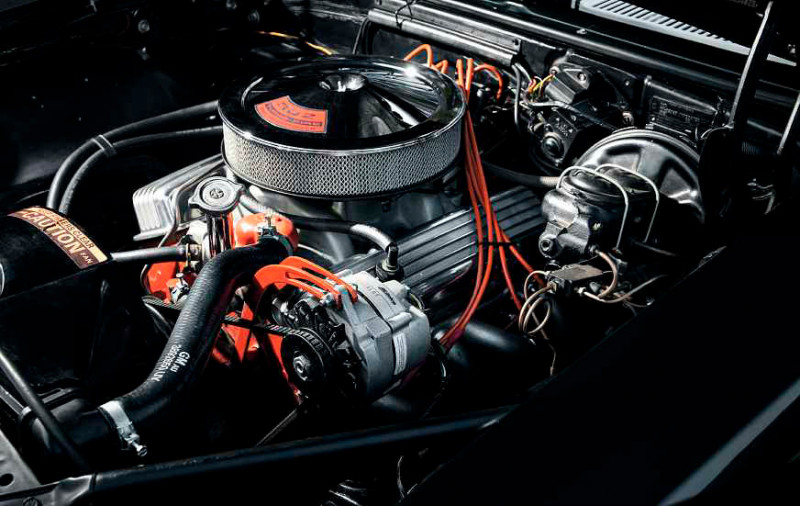
Fast-forward to June 2018. ‘Amanda got in touch to say she’d found this Camaro up in the north-west,’ says Stuart, ‘and when Chris checked it out for her, he realised it was a car we’d sold in the early ’70s to a local man. He kept it for years and years, until we bought it back from him.’
Chris fills in some more detail: ‘The chap we sold it to was called George Sumner and he ran the Swan Inn at Marbury, near Whitchurch. This was in January 1974. He didn’t use it a lot; he just liked having it and kept it covered up inside. We bought it back in September 1986.
‘Because it had been covered over, however, it had got damp and the paint had microblistered. We sold it to another local chap we knew, Eric Price, who was an ex-Rolls-Royce painter and who stripped it down and restored it to as-new condition, just for his own satisfaction. We were very familiar with the quality of his work because he had also painted our first racing Camaro in its Brut 33 sponsor’s livery during the early ’70s.’
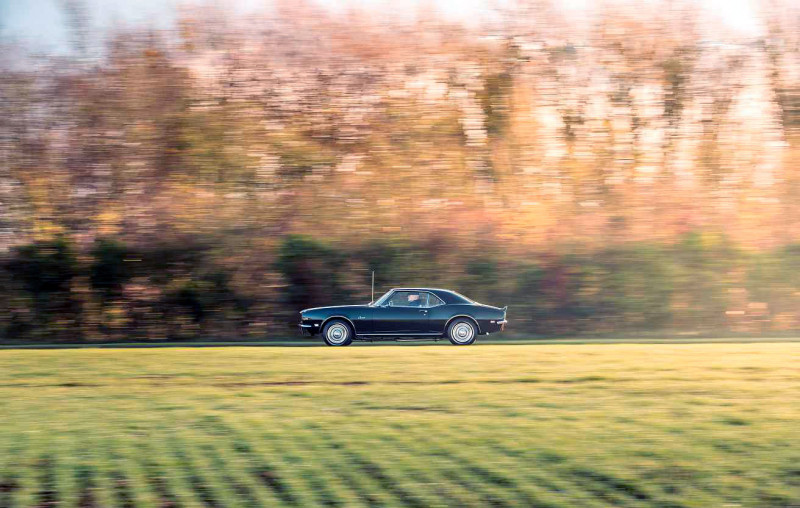
It should be noted that the Camaro that Stuart raced, and for which Chris built the engine, was the second-generation model, introduced in 1970. ‘Les Leston, the car accessory guy, was racing a Camaro at Silverstone but it wasn’t running right, so Stuart suggested I see if I could sort it out for him,’ explains Chris. ‘I set it up by ear in the paddock and Les was so delighted, he sent the car over to us for prepping afterwards. Then, when Les was away on a business trip in Hong Kong, he asked Stuart to race it for him at Oulton Park, and Stuart put it on pole and won easily, so we decided we really needed to get ourselves a Camaro!’
Below and opposite Imitation wood-rim wheel lifts an interior that’s a sea of black plastics; instrumentation is comprehensive but not the easiest to read at a glance.
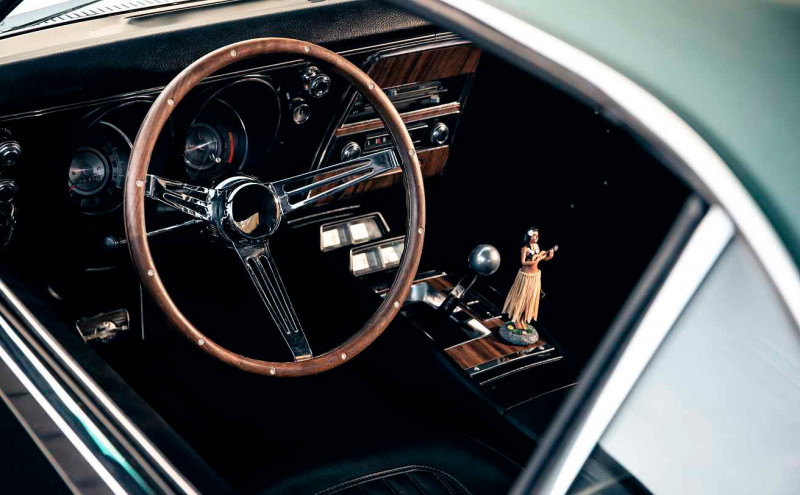
‘Camaros were very underrated until then,’ confirms Stuart. ‘I was running an E-type as a road car but I needed something a bit bigger and when I tried a Z/28 I thought “Crikey!” It left the E-type for dead, and it looked pretty attractive, so it made a great fun car. We started selling Camaros to some of our pals and then, as the racing developed and Camaros were being used for club events, we built up a business selling parts for them, and engines that were built by Chris.’
After Chris had reported back to Amanda that the car she was interested in was a really good example, she commissioned him to get the engine running properly – the fuel pump was faulty and it needed a good tune, but little else was required. ‘I was genuinely impressed by its condition,’ Chris adds. ‘After Eric had finished restoring it in 1994, he only used it for shows and otherwise kept it in a “bubble” with fans for ventilation.’
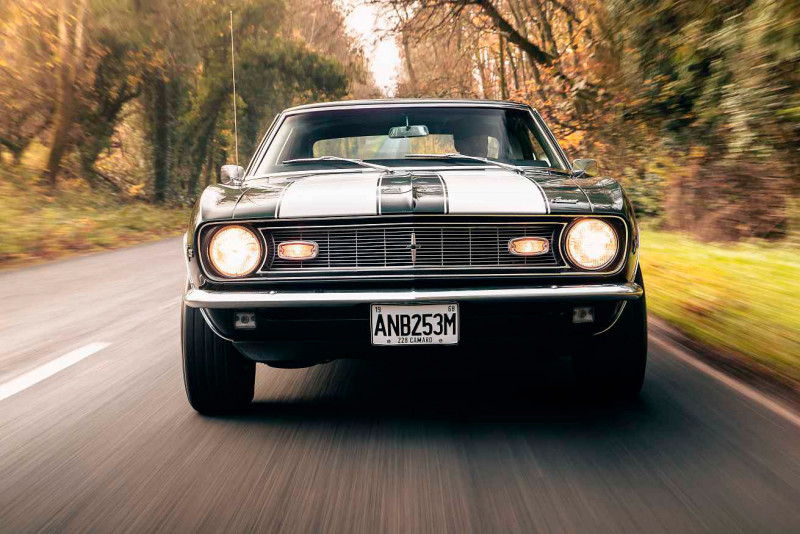
‘Restoration’ is too strong a word, really, because the Camaro needed little more than new paint and some service items such as wheel cylinders and an exhaust system. The windshield had to be replaced due to a wiper scratch, and both bumpers renewed, but the interior is entirely original, right down to the pedal rubbers and the door seals. These details, along with MoT certificates from 1975 and ’76 that show the recorded mileages of 15,900 and 19,269 respectively, corroborate today’s figure of 22,636 miles. This has to be one of the most remarkably untouched examples of a 1968 Z/28 to be found anywhere – including the States. And now it’s time to drive it. First impression – apart from its incredible condition, surely even better now than when it left the Norwood, Ohio, factory in late April 1968 – is how big it looks compared with my own 1966 first-gen Mustang.
The muscle car race was well into its stride by ’68 and even supposedly compact pony cars such as the second-gen Mustangs and their GM rivals had grown exponentially, along with their horsepower. It is, frankly, a little intimidating, particularly since it’s sitting on deep-dish wheels – the Z/28-only 15in version of the ‘Rally’ type with turbine centre caps – and very butchlooking tyres. More on those later.
Open the hefty driver’s door, slip behind the faux walnut, plastic-rimmed wheel, and it’s standard-issue late-60s US automobile. Seat coverings, doortrims, dashboard: they’re all black plastic and vinyl, enlivened with bright-metal embellishments and, yep, more fake wood on the centre console. But the upside of that is that this interior has lasted fantastically well, and it doesn’t show a hint of its 55-year age. When, in 1967 movie The Graduate, Mr Maguire collars young Benjamin Braddock at his graduation party and delivers the immortal line: ‘I want to say one word to you, Benjamin. Just one word. “Plastics,”’ before going on to explain that there is a great future in plastics, he isn’t wrong. Standard transmission for the Z/28 was a four-speed Muncie manual, and its chrome flat-sided lever projects from a curious (to UK eyes) open gate on the centre console.
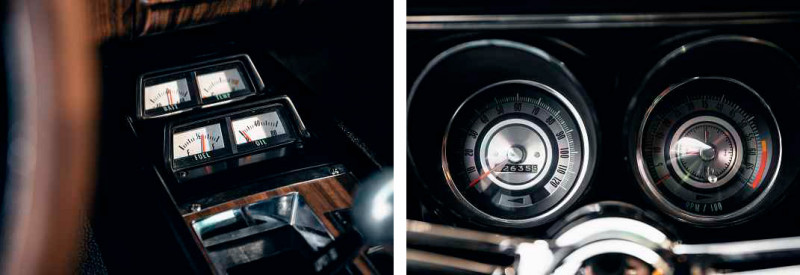
Check it’s in neutral and turn the key. Wow! The 5.0-litre V8 sounds as meaty and threatening as the dramatic exterior has promised, erupting into life with a pulse-quickening rumble. Slot the Muncie-embossed lever into first and ease away, however, and the noise becomes surprisingly creamy and smooth, maintaining that refinement as you accelerate up through the gears; it’s by no means a raw race-engine kind of voice, even though plenty of the 302 V8s saw track action.
The engine is a bit fluffy at low revs, so you need to goose the throttle to get it cleanly off the line, and here’s where the foot-operated parking brake proves a disadvantage: turning uphill out of a junction, say, you really need to come to a complete halt, apply the brake, put the transmission into neutral, then juggle clutch and throttle – and the motor is going to bog down if you don’t feed it enough revs, remember – at precisely the moment you pull the brake release lever. If ever a situation is going to make you wish you were driving an automatic, it’s this one. First and second gears are also quite high, which doesn’t help.
The steering is also unbelievably heavy when making a turn from rest. At first glance, I’d assumed the car was shod with wider-than-standard tyres – and, in fact, the rears are indeed wider than the fronts (245/60R15 versus 215/65R15) – but the fronts are actually about the right size. The Z/28 was specified to take the old US tyre size F70x15 all-round and that translates approximately to the metric size on the front now. Comparing a period brochure with our photographer Jonny Fleetwood’s excellent set of pics, however, the new versions definitely appear to fill the arches more, so the mystery isn’t yet resolved. Is it a profile quirk, something to do with the actual shape of the tyre?
On the straightaways (sorry, slipped into US jargon for a moment there) the steering proves accurate and sharp – ‘the steering is fast ratio,’ claimed Chevy’s promotional leaflet in ‘68 – with just a trace of numbness around the centre. There’s no anxiety here about using the ample performance, which is particularly evident in the midrange, the tall gearing seeming to fractionally blunt this car’s off-the-line getaway. Make no mistake, it’s quick – but it’s not dragster quick, at least initially. Given the Camaro’s physical size, maybe that’s a blessing on UK roads.
It certainly rides well, though, with any low-speed jiggliness tending to disappear at speed as this big car steamrollers the bumps into submission. As a package – barring a little wind rustle – it’s actually a very civilised way to travel, with plenty of room for front-seat occupants and, of course, a boot large enough to dispose of at least one body. That wonderful V8 exhaust soundtrack never fades away completely but it remains a pleasant companion rather than an irritating distraction, and it strikes you that this would be a fantastic machine for properly long road trips. Mechanically, it is surely bulletproof – Chris Graham claims that none of the many Camaro engines he built for race and road customers ever gave any trouble.
The Z/28 has huge character and that means it has one or two flaws, as with any memorable car. The minor instruments are tucked away at the base of the centre console, so you have to take your eyes well off the road to check their readings – and you’ll be doing that quite often, just to watch the fuel gauge dropping. The speedo and rev-counter are deeply cowled, too, so their fine needles aren’t that easy to discern when you’re in a hurry. But these are minor quirks. If it were mine, I’d fit an EZ power steering conversion (bolton and reversible, so no risk to that precious originality) and then I reckon it would be near-perfect.
Amanda Stretton agrees, so it is surprising that she’s reluctantly decided to put it up for sale. ‘It’s just too nice, too low-mileage for me to want to nail it everywhere,’ she explains. Duncan Hamilton ROFGO have it on the market for £97,500 which, for such a unique and rare survivor, doesn’t seem outrageous, particularly when you compare it to equivalent Mustang GT350 prices (a one-owner, 29,000-mile GT350 sold at auction for $396,000 in 2022). Amanda clearly made a good call when she chose this instead of a tired Shelby.
Inevitably, however, a part of her doesn’t want to sell it, but she’s recently bought another car to sit alongside the 1969 Fiat 500 that’s also in her garage. Turns out that the new purchase is a mint-condition Alfa Romeo Montreal.
Go, girl, go! End.
THANKS TO Jack Tetley at Duncan Hamilton ROFGO, dhrofgo.com.
TECHNICAL DATA 1968 Chevrolet Camaro Z/28
- Engine 4942cc OHV V8, four-barrel Holley carburettor
- Max Power 290bhp @ 5800rpm (claimed)
- Torque 290lb ft @ 4200rpm (claimed)
- Transmission Four-speed manual, rear-wheel drive
- Steering Recirculating ball
- Suspension Front: unequal-length wishbones, coil springs, telescopic dampers, anti-roll bar. Rear: live axle, leaf springs, telescopic dampers
- Brakes Front discs, rear drums, power-assisted
- Weight 1676kg
- Top speed 132mph
- 0-60mph 6.9sec


